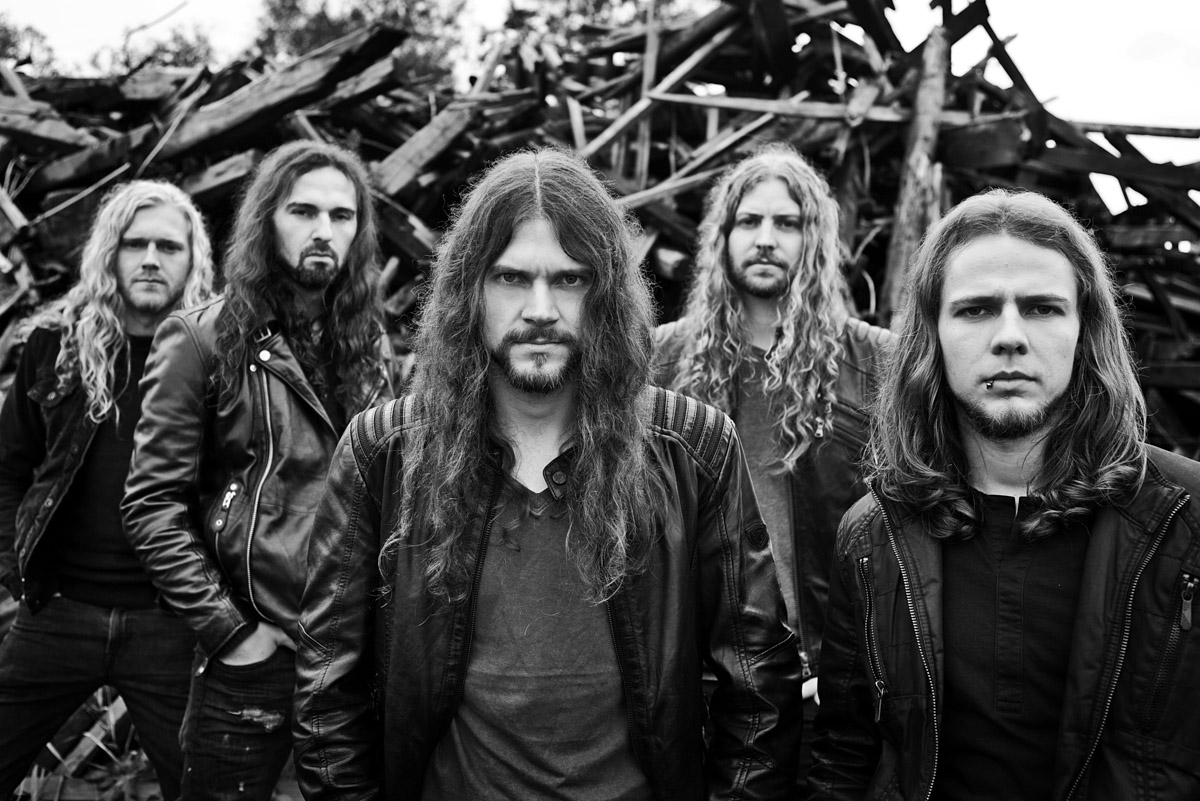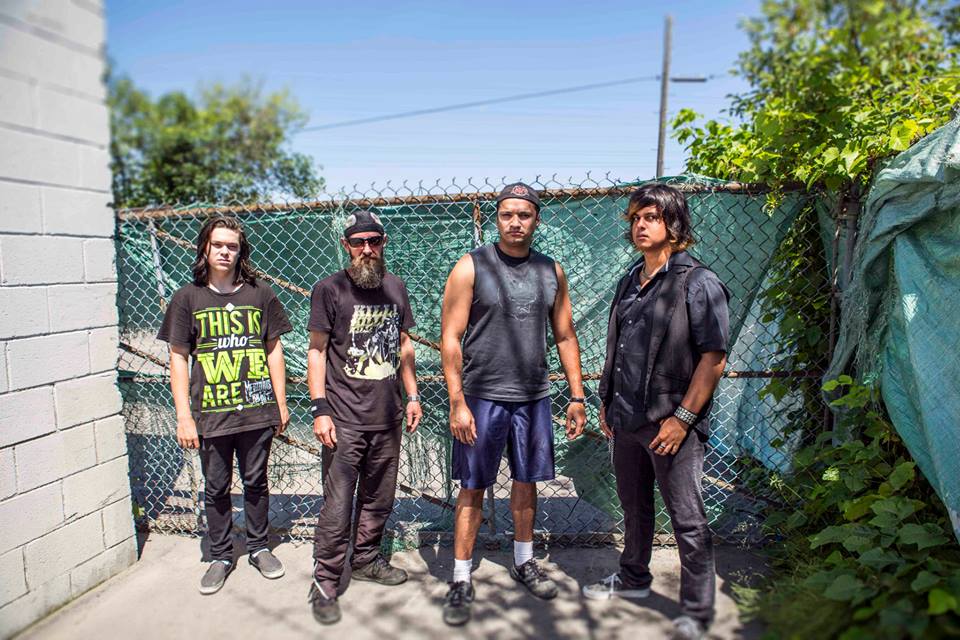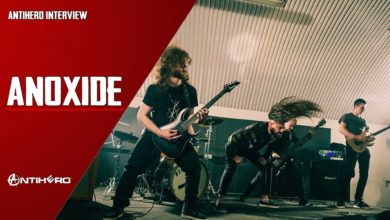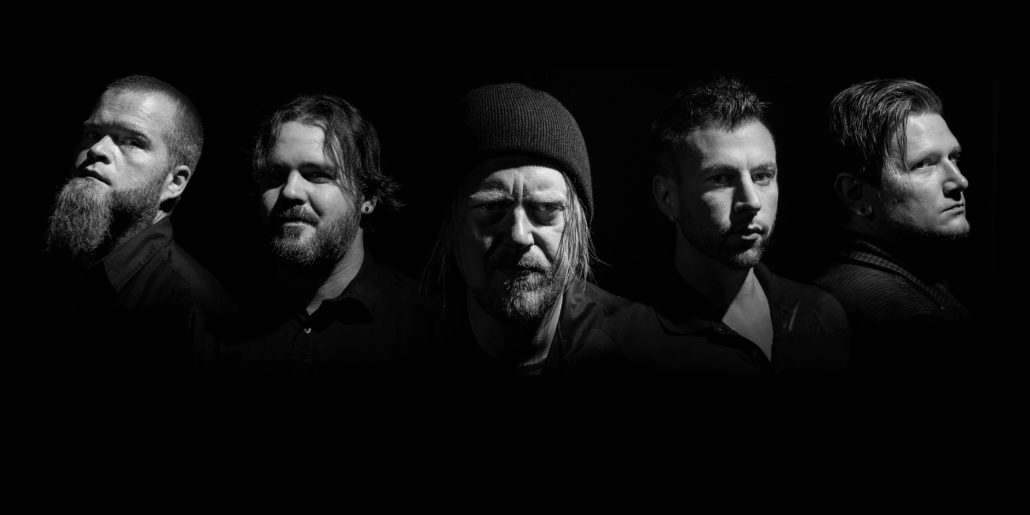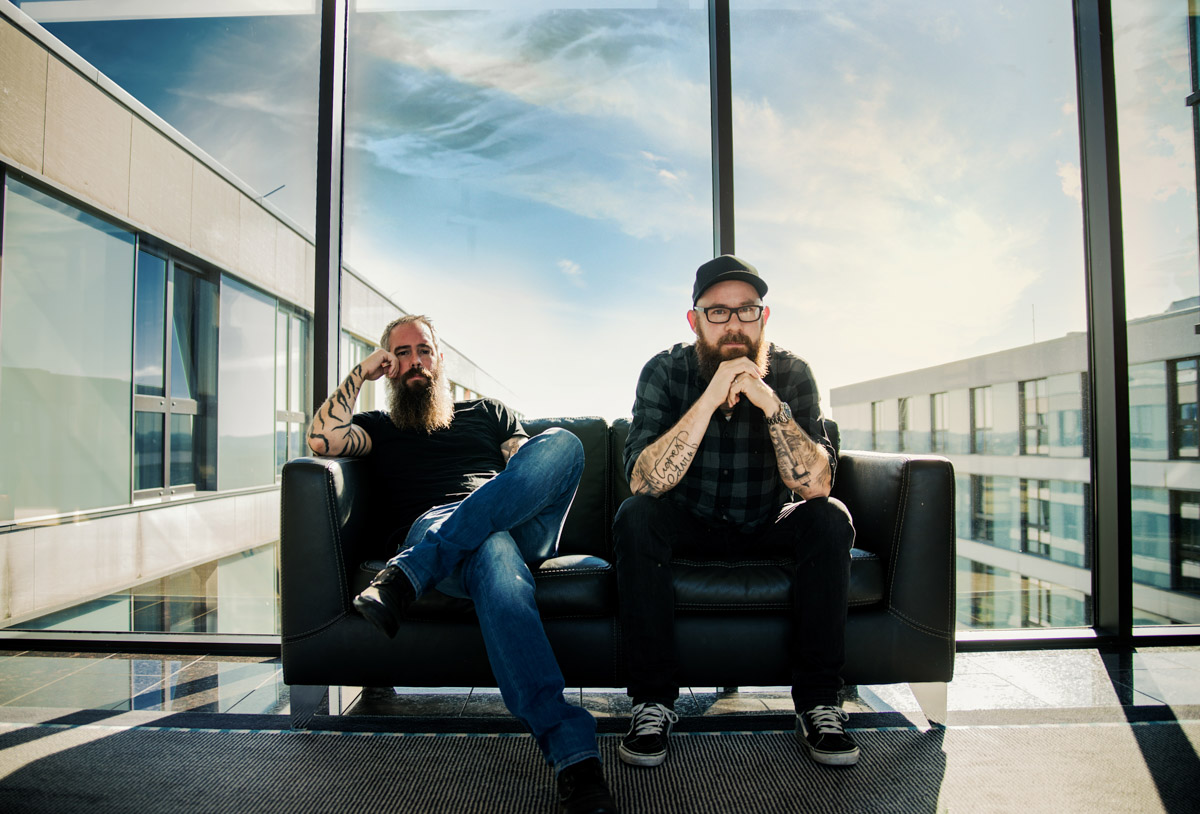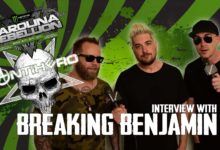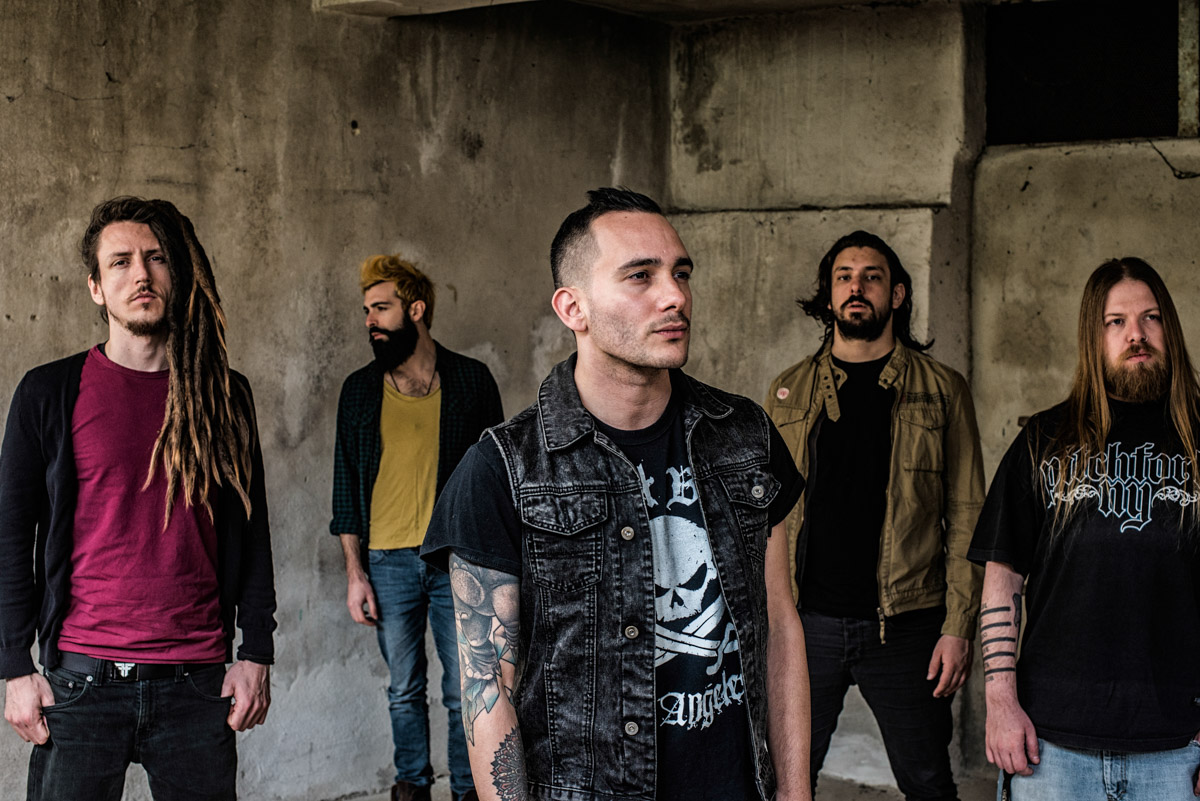AntiHero Magazine photojournalist Scott Martin spoke to Raimund Ennenga, vocalist for German melodic death/doom metal group, Nailed To Obscurity.

ANTIHERO: Can you tell me a little bit about how Nailed to Obscurity was started?
Raimund Ennenga: Yeah, Nailed to Obscurity was started in 2005 by our two guitarists Jan-Ole Lamberti and Volker Dieken, they both started the band based on the idea to form a band that is influenced by technical death metal. They were unable to play this kind of music and they slowed it down a little bit, and then the other members came into the band and after several changes on the drums and the bass the first real lineup of the band was formed. I think that was in 2006 or 2007, and they turned everything into this do me melancholic kind of death metal. Yeah, and in 2012 they asked me to join them, we were already friends because we’re all out of the same scene here in northern Germany and they asked me to join them and I was like yeah, I absolutely want to do this, because I love their music and they already released the at least a record, the first one. So, I jumped right in and recorded Opaque with them and I wrote the lyrics for that record and concluded the current one, is the first one that we did all together with this line up now.
ANTIHERO: So, they had a prior singer before you?
Raimund Ennenga: Yeah, they had two singers. They had one when they started, but he was not in the band for long, he left the band I think after less than one year and then Alexander Dirks joined the band in 2006 and he was the singer up until 2012. So, they had six years with that singer and he’s still a friend of mine. Everything is well with him, but he lost his interest in playing live, a lot and rehearsing and all that stuff, and then they just decided to separate until everyone was able to go into the direction that he wanted to go. So that’s that was my chance.
ANTIHERO: That’s great, so basically, it’s a mutual decision to split?
Raimund Ennenga: Yes.
ANTIHERO: There were no hard feelings, or anything? So, it was a mutual thing and everything is fine, you’re all still friends?
Raimund Ennenga: Yeah. I think when everything turned in this kind of direction it was not that mutual. But there was no bad blood, there were just some things that were sorted out, and now everything is fine. And he (Alexander) was visiting our record release show. So, I think everything is okay and we all get along very well when there’s a birthday, he’s invited and we all get along very well, so everything is okay.
ANTIHERO: Excellent, can you tell me, what is the concept behind the album King Delusion?
Raimund Ennenga: Yeah, there is no close concept behind that record. I think all the lyrics are more or less related to each other but not in the way that there is this storyline behind them, but I think the major themes behind the lyrics are more or less the same. So, I just might pick one song, so I go with a title track “King Delusion”. It’s about a feeling that you have, when you are in the situation of rage or frustration and then you are doing or saying things that you normally won’t do or say. And if you look back at that in retrospect it sometimes feels like someone else has done that or you were forced to do that by a higher power and that higher power is the thing that we describe as the King Delusion. And I think the whole lyrical direction of the songs is on that vein. It’s all about the feeling of frustration, how you act in that situation, or when you feel lost. This is more or less the lyrical direction of all the songs, but there is no close concept behind that.
ANTIHERO: Do you have any certain subject that inspired the song lyrics, or was it just kind of all over the map?
Raimund Ennenga: Wow, that is a tough question to be honest. Sometimes it’s just the line that I read in the book and I think wow that is an interesting point and I find my own kind of, let’s say, key to that, and write it all down. But sometimes it is just my personal feelings, I think that is my major inspiration when it comes to the lyrics. Because I am I’m very moody, I think everyone is kind of moody in a way, but I am also sometimes lost in my moods and I try to take this as an inspiration. When I’m very melancholic I sometimes lose myself in that feeling, but it’s also very inspiring when I look back at that in retrospect I can take a lot out of that. And it’s also very cool to have that channel, the music to let everything out. And as for the show, we play the show on Saturday last weekend, everything is great, I feel like a hippie; if you know what I mean. I feel that is like a catharsis. It’s like all the negative emotions are left on stage, I leave the stage and I’m released. And that is what music is doing with me, I am sometimes lost in frustration, in the melancholic mood or whatsoever, and then I write everything down. And I’m able to use my emotion as an inspiration for the lyrics and I rehearse with the other guys in the band and then I have my personal channel to get rid of them.
ANTIHERO: I imagine when you get off stage, you have a lot of adrenaline. Is there a certain thing you do to bring yourself down to earth after a great show, to kind of put you in your happy zen mode or something?
Raimund Ennenga: Yeah, that’s a good idea to be honest, but I think the first thing that we do is we hug each other, that is one thing because I do that with our drummer because we are the most nervous guys in the band. And before we go up on stage we’re like “oh my gosh shall we really do this?”, and then after the show it’s like it was awesome and I like you so much. And then all the positive energy that I can take from that and he can take from that show we give it to each other and as well to the rest of the band, that one thing that we always do. And the other thing is, we have to put all our stuff together again, that is also one thing that we have to do but it’s also a thing that brings us back to the ground, because you have to put the guitars into the cases and all the drum stuff and then you have to put everything into the van or the car or whatever, and that also calms you down a lot. And then you are able to go into the audience and take all the positive energy with them. And yeah, that that is the one thing that makes you happy in a way, but it also grounds you first because you have to do your work first and then you can celebrate the great energy that the show created. 
ANTIHERO: Can you tell me about the songwriting process? You’re the vocalist, do they write the music and then you write the lyrics, or is it a band effort on both ends?
Raimund Ennenga: We write everything all together, we are doing it in a very old-school kind of way. We are writing all the music in our rehearsal room all together, it’s not like sending files around or these kinds of things or using a taboo lecture software or whatever like Guitar Pro. It’s just basically throw your ideas around and arranging the songs. And I have not the biggest part in that process when it comes to the instrumental part, because I guess my personal ideas when it comes to the arrangements, but the other stuff is done by the instrumentalists and the band to be honest. But we do that all together and I write the lyrics also in the room next to our rehearsal room, while the other guys are playing. And that that is also a thing that makes this process very dynamic in a way, I can take all the energy that is created in the rehearsal room with me into the other room and write the lyrics. I think it works very well in the delusion, because I think in my personal opinion maybe you’ll see it either way but, I think the music and the lyrics they do work together very well, and I think everything feels like a unit much more than it did on Opaque. I think I love Opaque, but on Opaque it was a completely different kind of thing, because the music was written the way that the music was written this time, but I was not a part of the band while the music was written and I wrote the lyrics, when all the arrangements were already done. I had no impact on that and this time, sometimes you find you find a phrase and you try to find your rhythm and the rhythm is that cool, but you asked the drummer to play a different pattern to make it a little bit more obvious. And that was the case this time and that was something that was not possible, while we did opaque and that is a cool new opportunity to write for this version of Nailed to Obscurity also in the future.
ANTIHERO: How would you say that your vocal style is different than the previous singers that Nailed to Obscurity have had?
Raimund Ennenga: I think Alexander only uses a growl voice and he forced his voice a lot, and so everything was not that powerful because he was always at the very limits of his voice. I think that is a major difference, because I have a different technique and I think my voice sounds a lot different than the growl vocals, and I also add certain voices of mine into the songwriting, because I use clean vocals like you said, I use the whispering sometimes, I speak and sometimes I use a shout technique with my clean vocals, like a more… I don’t know how to say it, but it’s more like a raspy kind of voice. like a screaming voice, like a natural screaming voice I used that not so much on King Delusion, but on Opaque. And this whole variety of voices is new to the band, because on this there was only one voice for everything and that is a major difference I think.
ANTIHERO: Who influenced you to become the singer you are currently?
Raimund Ennenga: When I started growling it was with my other band, I’m still in that band, Burial Vault. My major goal was to sound like Glen Benton from Deicide to be honest, because it’s insanely deep the voice that he is using, and I always wanted to be like him, not him as a person or whatever, but vocally he was really my goal. And then Peter Tägtgren from Hypocrisy, the early stuff by Hypocrisy, after he took the vocal duties in the band, that there was also a major influence of me because he didn’t only use that growl voice, but also that screaming technique, and in Burial Vault I do a combination of both, and that was basically because of Hypocrisy. But these days I also love Mikael Åkerfeldt of Opeth.
ANTIHERO: I’ve been thinking about that the whole time when we are talking about growlers. I was thinking, he has the perfect combination of growling and clean vocals. It’s like it’ll start off with the clean vocals and then he’ll start growling and then he’ll go back to clean and so on. Opeth’s music is so diverse, he is such an amazing singer.
Raimund Ennenga: Absolutely, I totally agree with that because when I first listened to Opeth it was like wow, unfathomable what was that. And yeah, I followed the band ever since and I also like their newer albums. Not everyone in the band is still following Opeth and I completely understand that. But when you go to an Opeth concert and they play a set list that’s a combination of all their records like they do these days, it’s absolutely insane. What great music was written under the moniker Opeth, it’s really great. And another vocalist that I also like a lot is Tomi Joutsen from Amorphis, because he’s also a vocalist that can come up with a very strong clean vocal voice and very great growls. And he’s also able to pull that off in a life situation so well. I would say Opeth and Amorphis when it comes to vocals they are like the major goal that you have to have as a vocalist.
ANTIHERO: Describe the recording process for King Delusion?
Raimund Ennenga: Yes, I have to go back to the Opaque record. I was only recording the vocals and we did that in Lübeck in Northern Germany or near Hamburg. And that was also interesting, but we weren’t all there, not all the guys in the band. It was just me, Jan-Ole, and the guitar player joined me there on the second day. But it was just like I’m doing my thing for the record, but where are the other guys and that kind of thing. On this record, we worked with guitarists Victor Santura (Dark Fortress/Triptykon/Noneuclid) and Asvargr (Dark Fortress), and he was the producer that we really wanted to work with, that has to be set first. And he was interested because he liked Opaque and we were there for two and a half weeks in his studio all together, all the members in the band and were able to follow each step of the recording process, and that made us really more respectful for the other parts that each member has in the band. And the recordings went very smooth because we were very well-prepared, all the songs were written before we entered the studio, there were some very tiny things that we changed or added but it was more or less written before we entered the studio. And that allowed us to really experiment with guitar sounds and with also with the drums because we were using lots of room, because we had great microphones there. Yeah, it was a very great experience and it was also a great time that we had with Victor. Because he was like the sixth member in the band, he gave us his opinions and when we were finished with the recording stuff, we did barbecue’s we…yeah, we had a lot of fun there with him, he has a very similar sense of humor. He was really a guy yet to hang out with, he is still very closely visited a show that we did him unique with Dark Tranquility. We were still in contact with him and that was a very positive experience and was a real band experience that was also very important for me to say that, because yeah, we didn’t have that on Opaque but now it was all the members were there and we were hanging around with each other and had a great time and yeah it was a great experience and I think we will we will definitely work with Victor again in the future hopefully.
 ANTIHERO: Your album cover for King Delusion is quite wicked looking. Who did the album artwork?
ANTIHERO: Your album cover for King Delusion is quite wicked looking. Who did the album artwork?
Raimund Ennenga: Yeah. It’s an artist from Argentina and the idea to work with him was an idea from Jan-Ole, our guitarist. His name is Santiago Caruso, and Jan-Ole has a girlfriend and her family is from Argentina or her father is from Argentina, and he visited the family of her father there. And then he stumbled upon this artist and he sent us a link that we were able to see his portfolio, and it was really mind blowing. I was really surprised by all the details that he’s adding into his paintings and also the direction of his paintings. We all agreed that this artist would be the best choice to work with. And we contacted him and he was interested, and then he asked us for inspiration and we sent him the instrumental versions of some of the songs because they were already rerecorded and prerecorded and we sent him the lyrics for the songs, and then he came up with some sketches and they looked really great, he really nailed our ideas when it comes to the mood of the music, as well as the lyrics, and he sent us his ideas, and then he finalized. Yeah, they are all painted with, I don’t know the right word for it, but it’s like a mixture between painting and scratching, and he did all the artwork. It’s not just the cover itself, it’s also in the layout of the booklet and on the book or the vinyl version, when you open it there are so many great details that are based on the lyrical ideas; like the guy that is flying about his problems, and the person that lays on the floor and is in a state between reality and his inner self, and all that stuff. Everything is within the imagery and yeah, it’s really, I think that the best possible art work that we could have for that record, it fits so well with the mood of the music and the lyrics, it’s really cool.
ANTIHERO: Do you feel it’s important to step out of your comfort zone when it comes to writing lyrics and songs?
Raimund Ennenga: Yeah, I think it is definitely important because that allows you to evolve. If you always try to stay out of your comfort zone, you’re also able to come up with great ideas. Look at bands like Slayer or ACDC. They found their formula and they know that they shouldn’t leave that. And it works for them and they’re doing great with that, but we are not that kind of band, we really like to evolve. I think we always try to put something new into our songwriting when we write new songs. That was the case, if you have a look at this; from Abyss to Opaque, and from Opaque to King Delusion. It was not just the changing of the vocalist. It’s the music itself. There’s always something different. I think “King Delusion” is a lot more sinister and there are some parts that really remind me of Pink Floyd, especially when it comes to one particular solo. It’s very open when we write songs, everything is possible and there are no boundaries. Sometimes you hear a melody and you think it’s not really fitting. That is also the case, but we were not trying to avoid anything that could be “untrue” to the stuff that we did before, because we try it first and if it’s not working, it’s not working. But if it’s working, it’s even cooler. So that allows us to evolve.
ANTIHERO: I think like a couple of great examples of stepping out of your comfort zone, I think it’s like Celtic Frost.
Raimund Ennenga: Absolutely, a great band. And did you know that Victor, our producer, was a member of the final lineup of Celtic Frost? And he is in Triptykon which is the follow up band. And he’s the producer and the guitarist. So, that he was in Celtic Frost and is in Triptykon were two of the reasons why we wanted to work with him. You definitely named the right band.
ANTIHERO: That’s funny, I bring that up because early Celtic Frost was legendary Black Metal and then they decided to veer away from the familiar sound and put out the album Cold Lake. And then the other thing, Opeth was a great example of that too. Their early stuff like Deliverance, Blackwater Park, and Still Life, to name a few, had the growling vocals and you have the clean vocals alongside the heavy guitar/keyboard influenced sound. Then later on, Storm Corrosion, Heritage, and Sorceress, to name a few, has more of a progressive sounding feel, less heavy, no heavy riffs. I personally am a huge supporter of the direction that Opeth is going towards.
Raimund Ennenga: Yeah, absolutely. And that is also a thing that is true about making music, you have to do that for yourself in the first place, and then for the fans, because if you do it the other way around, you’re just a slave. So, I think it’s important to be honest to yourself, do whatever you want to do and want to hear in the music. And if there are people that don’t like it, that’s it.
ANTIHERO: You have to play music that you like. I mean just like we said AC/DC, Slayer, Iron Maiden, all those bands have a sound and they haven’t swayed away from it and it’s worked, they don’t need to. I mean from the first Slayer album, to the last Slayer album, I mean that’s one band that’s been extremely consistent. They’ve never gone commercial. I mean those type of bands.
Raimund Ennenga: Yeah, and it’s absolutely okay, there’s nothing wrong with that, but I really like the bands that are…I think the next step has not necessarily been foreseeable and that is why it’s interesting that keeps it fresh; for me personally. I won’t ever say that anything is wrong with fans of bands like you said AC/DC, Iron Maiden, Slayer… That’s cool… I like Slayer. Sometimes I’m in a mood and really want to listen to Slayer. That’s cool, but I like these bands that come up with something fresh and new, and it’s also the case with some Kreator, in a way. You know the Endorama record that they did in the 90s? I like the record, to be honest, and they still incorporate that melancholic melodies into newer songs, but now they’re like the thrash Titans again in Germany they’re very big, but I think that the Endorama album did a lot more with them, than other people might think and that is also I think a smart step. Just try it on one record and okay, it didn’t work, change the formula but keep it to be honest to yourself, maybe that could also happen with us. Maybe we do record that is completely different and that people might think what! And we think okay yeah that was a little bit too much but we keep something off that, that is also interesting but it’s all about the evolution of the music itself and the honesty of the artists towards their own art.
ANTIHERO: What is your opinion of online steaming such as Spotify and Pandora?
Raimund Ennenga: Yeah. I am 31 years old, I am no digital native but I get contact to that very early on, while I was, I think around 12 or 13, and downloaded illegally to be honest, the first via Napster in the late 90s. So, I absolutely understand that, I always bought CDs too, I still do and I love that because it’s like you you’re able to have a look on the cover and you have a good sound quality, but these days you get when it comes to the sound quality you get the same sound quality via all the streaming distributions like Spotify or whatever. So, I understand that people are using that, but…
ANTIHERO: I understand that it takes money out of your pockets as a musician, because people aren’t buying the CD. But on the other hand, someone may buy a ticket to see you, and while there, buy a t-shirt or what not.
Raimund Ennenga: Yeah, and there is nothing wrong with that, I absolutely understand that, because as you said, you don’t have to use space in your house for that. You all have it in your pockets, like Steve Jobs said and that is absolutely okay. But for me as a music admirer and a guy that grew up buying CDs and now buying vinyl, for me it’s still important to have my original copy of a record and put that in my personal collection. But I wouldn’t ever say there’s anything wrong with not doing it the way that I do it but, because then I would say that my way of handling is the best way and I don’t see myself as that kind of a guy with the best idea of handling music love or love for music. But as a musician, I think the greatest thing is when you start writing a record, there’s just… it’s just a blank page, and you fill it with emotions, you fill with ideas, you fill it with melodies, with notes, you fill it with growls and all that stuff and in the end, you record it, and then you have you have it in your hands. It’s like an idea that came out of your mind is a physical thing album, and that is for me personally the coolest thing. I had it with Nailed to Obscurity, always when we recorded the record and we have the final version in our hands, it’s such great honest feeling and I think that is the reason why I still love buying music, because I know all the other bands have the same feeling when they are finished with their record. Because I personally think it’s important, I would always do it this way, but I don’t blame anyone that is saying I don’t need it. I listen to music on Spotify, and like you said, I visit your concerts, I pay money for that and I buy a T-shirt and I support you the best I can, and I spread the word all over the Internet and through all my friends, and I think that is the same support that I can get from a guy that bought our CD and is listening to it in his room.

